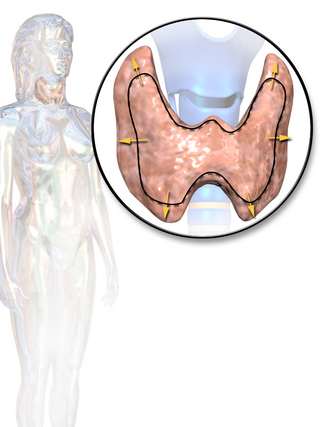
Hyperthyroidism is the condition that occurs due to excessive production of thyroid hormones by the thyroid gland. Thyrotoxicosis is the condition that occurs due to excessive thyroid hormone of any cause and therefore includes hyperthyroidism. Some, however, use the terms interchangeably. Signs and symptoms vary between people and may include irritability, muscle weakness, sleeping problems, a fast heartbeat, heat intolerance, diarrhea, enlargement of the thyroid, hand tremor, and weight loss. Symptoms are typically less severe in the elderly and during pregnancy. An uncommon but life-threatening complication is thyroid storm in which an event such as an infection results in worsening symptoms such as confusion and a high temperature; this often results in death. The opposite is hypothyroidism, when the thyroid gland does not make enough thyroid hormone.

Hypothyroidism is a disorder of the endocrine system in which the thyroid gland does not produce enough thyroid hormone. It can cause a number of symptoms, such as poor ability to tolerate cold, a feeling of tiredness, constipation, slow heart rate, depression, and weight gain. Occasionally there may be swelling of the front part of the neck due to goitre. Untreated cases of hypothyroidism during pregnancy can lead to delays in growth and intellectual development in the baby or congenital iodine deficiency syndrome.

Harvard Medical School (HMS) is the graduate medical school of Harvard University and is located in the Longwood Medical Area in Boston, Massachusetts. Founded in 1782, HMS is one of the oldest medical schools in the United States. Unlike most other leading medical schools, HMS does not operate in conjunction with a single hospital but is directly affiliated with several teaching hospitals in the Boston area. Affiliated teaching hospitals and research institutes include Dana–Farber Cancer Institute, Massachusetts General Hospital, Brigham and Women's Hospital, Beth Israel Deaconess Medical Center, Boston Children's Hospital, McLean Hospital, Cambridge Health Alliance, The Baker Center for Children and Families, and Spaulding Rehabilitation Hospital.

Brigham and Women's Hospital (BWH) is the second largest teaching hospital of Harvard Medical School and the largest hospital in the Longwood Medical Area in Boston, Massachusetts. Along with Massachusetts General Hospital, it is one of the two founding members of Mass General Brigham, the largest healthcare provider in Massachusetts. Robert Higgins, MD, MSHA serves as the hospital's current president.

Levothyroxine, also known as L-thyroxine, is a synthetic form of the thyroid hormone thyroxine (T4). It is used to treat thyroid hormone deficiency (hypothyroidism), including a severe form known as myxedema coma. It may also be used to treat and prevent certain types of thyroid tumors. It is not indicated for weight loss. Levothyroxine is taken orally (by mouth) or given by intravenous injection. Levothyroxine has a half-life of 7.5 days when taken daily, so about six weeks is required for it to reach a steady level in the blood.

Thyroid disease is a medical condition that affects the function of the thyroid gland. The thyroid gland is located at the front of the neck and produces thyroid hormones that travel through the blood to help regulate many other organs, meaning that it is an endocrine organ. These hormones normally act in the body to regulate energy use, infant development, and childhood development.

Elizabeth Nabel is an American cardiologist and Executive Vice President of Strategy at ModeX Therapeutics and OPKO Health. Prior to this role, she served as President of Brigham Health and its Brigham and Women's Hospital, Professor of Medicine at Harvard Medical School, and Director of the NIH's National Heart, Lung, and Blood Institute.

Lawrence H. Cohn, was an American-born pioneering cardiac surgeon, researcher, and medical educator. He had been on the surgical staff at Harvard Medical School since 1971 and had been a Professor of Surgery at Harvard Medical School since 1980. In 2000, he was awarded the first endowed Chair in Cardiac Surgery at Harvard Medical School.
Thyroid disease in pregnancy can affect the health of the mother as well as the child before and after delivery. Thyroid disorders are prevalent in women of child-bearing age and for this reason commonly present as a pre-existing disease in pregnancy, or after childbirth. Uncorrected thyroid dysfunction in pregnancy has adverse effects on fetal and maternal well-being. The deleterious effects of thyroid dysfunction can also extend beyond pregnancy and delivery to affect neurointellectual development in the early life of the child. Due to an increase in thyroxine binding globulin, an increase in placental type 3 deioidinase and the placental transfer of maternal thyroxine to the fetus, the demand for thyroid hormones is increased during pregnancy. The necessary increase in thyroid hormone production is facilitated by high human chorionic gonadotropin (hCG) concentrations, which bind the TSH receptor and stimulate the maternal thyroid to increase maternal thyroid hormone concentrations by roughly 50%. If the necessary increase in thyroid function cannot be met, this may cause a previously unnoticed (mild) thyroid disorder to worsen and become evident as gestational thyroid disease. Currently, there is not enough evidence to suggest that screening for thyroid dysfunction is beneficial, especially since treatment thyroid hormone supplementation may come with a risk of overtreatment. After women give birth, about 5% develop postpartum thyroiditis which can occur up to nine months afterwards. This is characterized by a short period of hyperthyroidism followed by a period of hypothyroidism; 20–40% remain permanently hypothyroid.
Kent Holtorf is an American physician and entrepreneur practicing in Los Angeles, California. He is a board examiner of the American Board of Anti-Aging Medicine (ABAAM), which is not recognized by established medical organizations. He is the founder and medical director of Holtorf Medical Group, a practice with five centers that offer treatment for conditions including fibromyalgia, adrenal fatigue, complex endocrine dysfunction, hypothyroidism, age management, chronic fatigue syndrome, low libido, chronic Lyme disease, migraines, PMS, perimenopause and menopause. His practice focuses on alternative therapies that are not recognised as effective. He has been criticized in the media for his controversial views on topics like bioidentical hormone replacement therapy and vaccines.
Elazer R. Edelman is an American engineer, scientist and cardiologist. He is the Edward J. Poitras Professor in Medical Engineering and Science at the Massachusetts Institute of Technology (MIT), Professor of Medicine at Harvard Medical School and at Brigham and Women's Hospital (BWH), and a practicing cardiologist at BWH. He is the director of MIT's Institute for Medical Engineering and Science (IMES), the Harvard-MIT Biomedical Engineering Center, and the MIT Clinical Research Center. He is also the Program Director of the MIT Graduate Education in Medical Sciences program within the Harvard-MIT Division of Health Sciences and Technology.
Robert Samuel Decosta Higgins MD, MSHA is an American surgeon working with heart–lung transplants. He is president, Brigham and Women's Hospital; Executive Vice President, Mass General Brigham.
Daniel David Federman, was an American endocrinologist and the Carl W. Walter Distinguished Professor of Medicine and the dean for medical education at Harvard Medical School. He helped change medical education at through its New Pathway curriculum around the early 1990s, and his work helped create the field of genetic endocrinology. Federman also worked for over thirty years at Boston's Brigham and Women's Hospital, a Harvard teaching hospital in the Longwood Medical and Academic Area.

Christine Edry Seidman is the Thomas W. Smith Professor of Medicine at Harvard Medical School and director of the Cardiovascular Genetics Center at Brigham and Women's Hospital. She operates a joint lab with her husband, Jonathan Seidman, where they study genetic mechanisms of heart disease. In recognition of her scientific contributions, she was elected as a fellow of the National Academy of Sciences, American Academy of Arts and Sciences, and National Academy of Medicine.
Mariana Castells is a Spanish-American allergist who focuses on mast cell diseases, including mastocytosis, mast cell activation syndrome and hereditary alpha tryptasimia. Mastocytosis is a rare disease with limited treatment options. Castells works at Brigham and Women's Hospital in Massachusetts in the Department of Allergy, Rheumatology, and Immunology and at the Dana Farber Cancer Institute. She is also a professor of medicine at Harvard Medical School.
Valerie Ellen Stone is an American physician who is a professor of medicine at the Harvard Medical School. She serves as Vice Chair for Diversity, Equity, and Inclusion, Department of Medicine, Brigham and Women's Hospital. She specializes in the management of HIV/AIDS, health disparities and improving the quality of medical education.

Michelle Evelyn Morse is an American internist. She is an assistant professor at Harvard Medical School/Brigham and Women's Hospital and co-founded EqualHealth and Social Medicine Consortium. In 2021, Morse was named the first Chief Medical Officer of the New York City Department of Health and Mental Hygiene.
Susan Redline is an American pulmonary specialist. She is the Peter C. Farrell Professor of Sleep Medicine and Professor of Epidemiology at the Harvard T.H. Chan School of Public Health.
Michelle Asha Albert is an American physician who is the Walter A. Haas Lucie-Stern Endowed Chair in Cardiology and professor of medicine at the University of California, San Francisco. Albert is director of the UCSF Center for the Study of Adversity and Cardiovascular Disease. She is president of the American Heart Association. She served as the president of the Association of Black Cardiologists in 2020–2022 and as president of the Association of University Cardiologists (2021–2022). Albert is an elected member of the National Academy of Medicine and the American Society of Clinical Investigators.
Dennis Kasper is an American microbiologist and immunologist, and the William Ellery Channing Professor of Medicine and Professor of Immunology at Harvard Medical School. He leads the Kasper Laboratory within the Blavatnik Institute in the Department of Immunology at Harvard Medical School. He was also executive dean for academic programs at Harvard Medical School and director of the Channing Laboratory Department of Medicine at Brigham and Women's Hospital.









